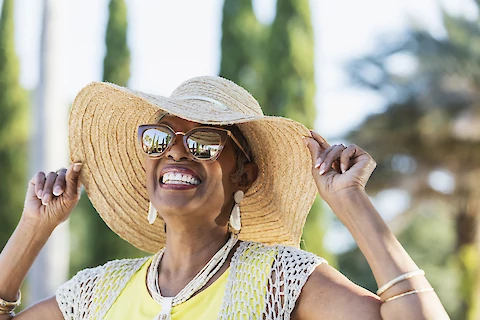
Senior Helpers® is here to provide home care and a wealth of resources for caregivers to share with their parents, in-laws, older patients under their purview, etc. When it comes to The OC, meaning the Greater Los Angeles area and not the LA metropolitan areas, the summer temperatures can be brutal on the older population. Luckily, there are ways to stay safe outdoors and have an enjoyable summer in the Greater Los Angeles area for individuals 65 and older.
Orange County itself is generally considered divisible into Northern and Southern sections, with locals often referring to the Costa Mesa Freeway as part of what separates the county into specific neighborhoods. However, all of these Southern California communities share the same climate. Based on the temperatures in the SoCal region, we have compiled a guide for personal assistants, caregivers, and others who work with older people and must keep them safe in hot weather.
Understanding the Mediterranean Climate and Keeping Older People Safe
Here's a guide about the kinds of temperatures to expect:
- The Mediterranean climate means arid, dry summers and cool yet rainy winters.
- Due to the mild winter temperatures, many older people move to Mediterranean climates.
- The warmest weather tends to run from July to September with peak temperatures in August.
- Irvine, Santa Ana, Tustin, and South Orange County neighborhoods will see the highest temperatures in August.
- The highest averages tend to range from approximately 81°F to 84°F, particularly during August.
- Based on these temperatures, the Heat Index reading will suggest that older adults are at risk for fatigue from extended exposure outside or if they participate in outdoor exercise.
Coping with Heat and UV Radiation in South Orange County
One strategy to combat the heat in the Greater Los Angeles area is to have supplies on hand for emergencies or refreshment purposes. The body experiences stress during high temperatures and aging is a normal process, but all people should take care of their bodies during the hot season. In general, some supplies to keep on hand include medications, plenty of water and beverages, and a way to contact health professionals if there's a chance that someone has a heat-related illness or fatigue.
Staying Cool Inside This Summer
One of the safest approaches to dealing with peak temperatures in summer is to stay indoors. When people stay inside, they have the option to use their own air conditioning device or find a cooling place in their town. One major thing to do during the summer is to avoid using air fryers, ovens, and other heat-producing devices in the home.
Many cities provide public cooling places where people can go if they don't have air conditioning, which includes great places like public libraries, recreation centers, and other areas that already welcome older people. When older adults stay indoors, they are protected from UV radiation and sunburns. If they wish to socialize with other older adults, it's always possible to head to cooling zones and meet friends there.
Being Safe Outside During Extended Exposures
It might not be possible for everyone to avoid going outside during the summer in Southern California. If older individuals need to go outside, it's definitely possible to do this safely by wearing the right clothing, which can include light-colored fabrics, lightweight materials, hats, sunscreen, and other summer-friendly attire. Many people carry portable fans and water bottles with them in the summertime.
When traveling or spending extended periods of time outside:
- Remember to drink plenty of fluids, excluding caffeine and alcohol.
- Consider taking comfort items like portable fans, hats, and water bottles.
- Carry cell phones to remain connected in case of potential issues with the heat.
- Monitor older individuals for signs of heat-related illnesses like fatigue, dizziness, shortness of breath, nausea, and disorientation.
- Stay in the shade as much as possible.
- Avoid being outside during the warmest part of the day.
If you follow all these tips and remain connected to medical facilities or the ability to reach them through cellular service, etc., then these preventative steps may help someone you love avoid dangerous temperatures in the Greater Los Angeles area.